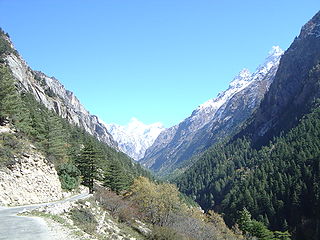| Look up trekking in Wiktionary, the free dictionary. |
Trekking is a form of backpacking.
Contents
Trekking may also refer to:
| Look up trekking in Wiktionary, the free dictionary. |
Trekking is a form of backpacking.
Trekking may also refer to:
| | This disambiguation page lists articles associated with the title Trekking. If an internal link led you here, you may wish to change the link to point directly to the intended article. |
Star Trek: Deep Space Nine is an American science fiction television series created by Rick Berman and Michael Piller. It originally aired from January 1993 to June 1999, in syndication, spanning 176 episodes over seven seasons. The fourth series in the Star Trek franchise, it served as the third sequel to Star Trek: The Original Series. Set in the 24th century, when Earth is part of a United Federation of Planets, its narrative is centered on the eponymous space station Deep Space Nine, located adjacent to a wormhole connecting Federation territory to the Gamma Quadrant on the far side of the Milky Way galaxy.
Star Trek: Enterprise, titled simply Enterprise for its first two seasons, is an American science fiction television series created by Rick Berman and Brannon Braga. It originally aired from September 26, 2001, to May 13, 2005, on UPN. The sixth series in the Star Trek franchise, it is a prequel to Star Trek: The Original Series, set in the 22nd century, a hundred years before the events of The Original Series and just prior to the formation of the United Federation of Planets. It follows the adventures of the Enterprise, Earth's first starship capable of traveling at warp five, as it explores the galaxy and encounters various alien species.

Trail riding is riding outdoors on trails, bridle paths, and forest roads, but not on roads regularly used by motorised traffic. A trail ride can be of any length, including a long distance, multi-day trip. It originated with horse riding, and in North America, the equestrian form is usually called "trail riding," or, less often "hacking." In the UK and Europe, the practice is usually called horse or pony trekking.
Tin Man may refer to:

Gangotri is a town and a Nagar Panchayat (municipality) in Uttarkashi district in the state of Uttarakhand, India. It is a Hindu pilgrim town on the banks of the river Bhagirathi and origin of river Ganges. It is on the Greater Himalayan Range, at a height of 3,100 metres (10,200 ft). According to popular Hindu legend, it was here that Goddess Ganga descended when Lord Shiva released the mighty river from the locks of his hair.

Dark Horse Presents was a comic book published by American company Dark Horse Comics from 1986. Their first published series, it was their flagship title until its September 2000 cancellation. The second incarnation was published on MySpace, running from July 2007 until August 2010. A third incarnation began in April 2011, released in print form once again.

Matheran is a hill station and a municipal council in Karjat Tahsil in the Raigad district in the Indian state of Maharashtra. Matheran is part of the Mumbai Metropolitan Region. Matheran is one of the smallest hill stations in India. It is located on the Western Ghats range at an elevation of around 800 m above sea level. It is about 90 km from Mumbai, and 120 km from Pune. Matheran's proximity to many metropolitan cities makes it a weekend getaway for urban residents. Matheran, which means "forest on the forehead" is an eco-sensitive region, declared by the Ministry of Environment, Forest and Climate Change, Government of India. It is Asia's only automobile-free hill station.
Impulse or Impulsive may refer to:
"If Wishes Were Horses" is the 16th episode of the first season of the American syndicated science fiction television series Star Trek: Deep Space Nine. The title is derived from the proverb "If wishes were horses, beggars would ride".
John Jackson Miller is an American science-fiction author, comic book writer, and commentator, known for his work on the Star Wars franchise and his research into comic book circulation history, as presented in the Standard Catalog of Comic Books series and the Comichron website.

Space Western is a subgenre of science fiction that uses the themes and tropes of Westerns within science-fiction stories. Subtle influences may include exploration of new, lawless frontiers, while more overt influences may feature literal cowboys in outer space who use rayguns and ride robotic horses. Although initially popular, a strong backlash against perceived hack writing caused the genre to become a subtler influence until the 1980s, when it regained popularity. A further critical reappraisal occurred in the 2000s with Firefly and Cowboy Bebop.
Star Trek is an American science fiction media franchise originating from the 1960s television series Star Trek, created by Gene Roddenberry. That series, now often known as "The Original Series", debuted on September 8, 1966, and aired for three seasons on NBC. It followed the voyages of the starship USS Enterprise, a space exploration vessel built by the United Federation of Planets in the 23rd century, on a mission "to explore strange new worlds, to seek out new life and new civilizations, to boldly go where no man has gone before". In creating Star Trek, Roddenberry was inspired by C. S. Forester's Horatio Hornblower series of novels, Jonathan Swift'sGulliver's Travels, the film Forbidden Planet, and television westerns such as Wagon Train.

Jean-Luc Picard is a fictional character in the Star Trek franchise, most-often seen as the captain of the starship USS Enterprise (NCC-1701-D). Played by Patrick Stewart, Picard has appeared in the television series Star Trek: The Next Generation (TNG) and one episode of Star Trek: Deep Space Nine, as well as the feature films Star Trek Generations (1994), Star Trek: First Contact (1996), Star Trek: Insurrection (1998), and Star Trek: Nemesis (2002). He is also featured as the central character in the show Star Trek: Picard (2020–present).

William Shatner is a Canadian actor, author, producer, director, screenwriter, and singer. In his seven decades of acting, he became a cultural icon for his portrayal of Captain James T. Kirk of the USS Enterprise in the Star Trek franchise. He has written a series of books chronicling his experiences playing Captain Kirk, being a part of Star Trek, and life after Star Trek. Shatner has also co-written several novels set in the Star Trek universe, and a series of science fiction novels called TekWar, that were adapted for television.

The Borg are an alien group that appear as recurring antagonists in the Star Trek fictional universe. The Borg are cybernetic organisms linked in a hive mind called "the Collective". The Borg co-opt the technology and knowledge of other alien species to the Collective through the process of "assimilation": forcibly transforming individual beings into "drones" by injecting nanoprobes into their bodies and surgically augmenting them with cybernetic components. The Borg's ultimate goal is "achieving perfection".

A long-distance trail is a longer recreational trail mainly through rural areas used for hiking, backpacking, cycling, horse riding or cross-country skiing. They exist on all continents except Antarctica.
A harbinger is a forerunner or forewarning, but may also refer to:

Ron Randall is an American comic book artist best known as the creator of the character Trekker.